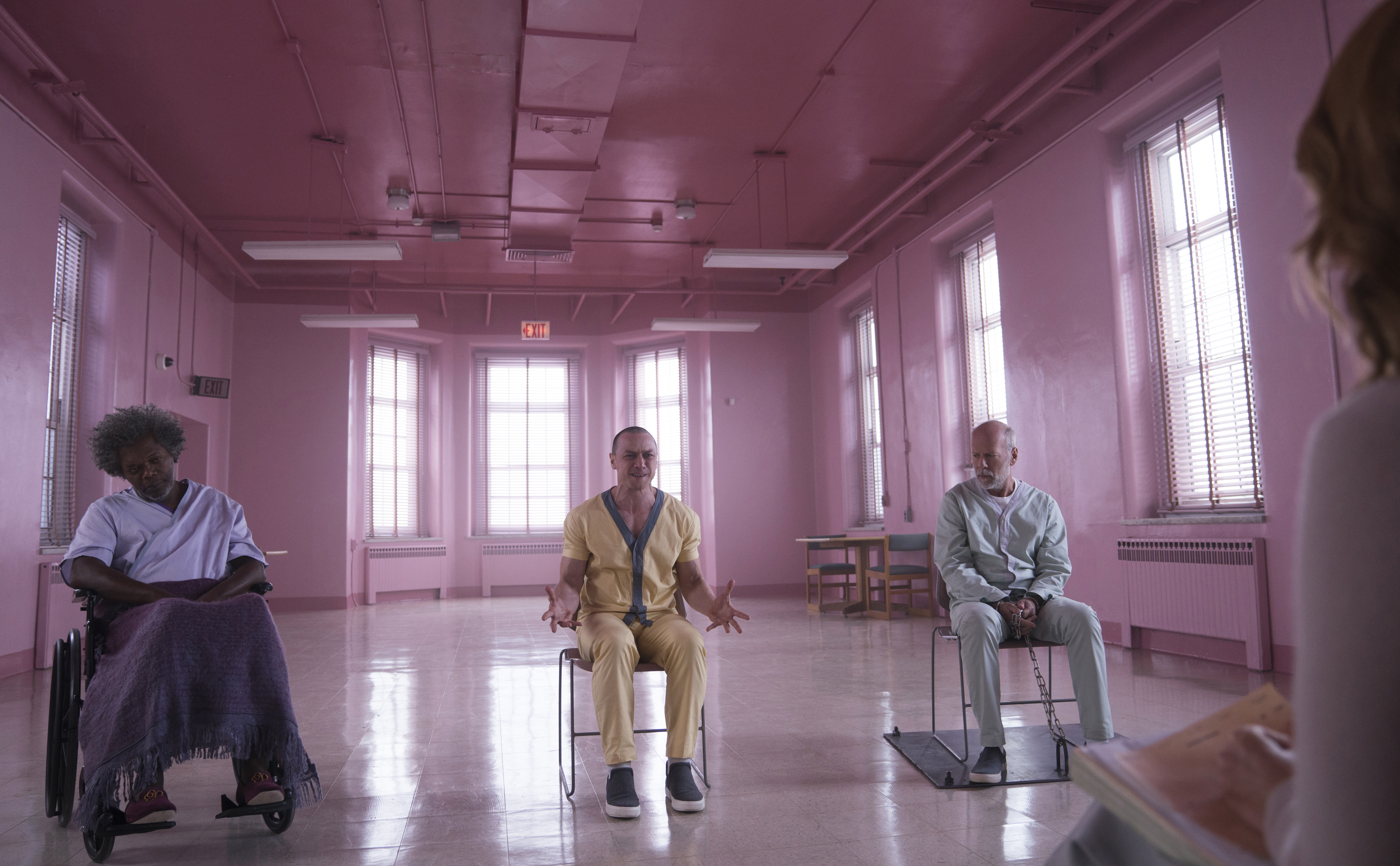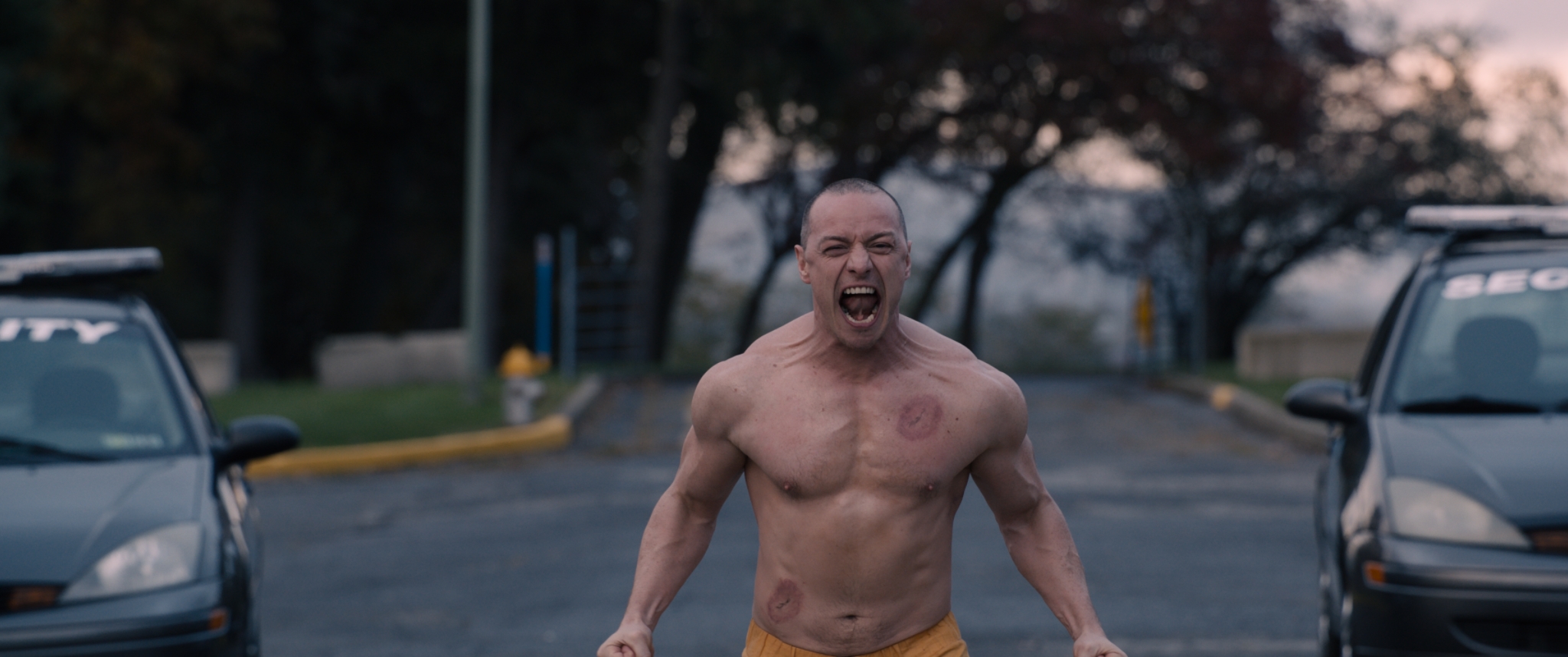Glass interview: M Night Shyamalan talks Unbreakable trilogy
Bruce Willis, Samuel L Jackson and James McAvoy unite for the final part of the comic-book thriller trilogy
In 2000 M Night Shyamalan released his twisty comic-book thriller Unbreakable starring Samuel L Jackson and Bruce Willis. It’s actually the fourth film Shyamalan wrote and directed, after debuting with low budget Praying With Anger, moving on to Rosie O’Donnell comedy drama Wide Awake, and putting himself squarely on the map with multi-Oscar nominee The Sixth Sense. It was a critical success and gained a cult following, but it wasn’t until 2017 that Shyamalan pulled another major twist out of the bag, revealing that multiple personality chiller Split starring James McAvoy exists in the same world as Unbreakable and is in fact part two of a trilogy.
Now in 2019 the third part, Glass is due to arrive, which will see Willis’ reluctant superhero David Dunn reunite with arch villain Elijah Price (aka Mr Glass) and encounter McAvoy’s Kevin Wendell Crumb and the many other characters which reside within him.
Den of Geek was lucky enough to see the first 22 minutes of the film. No spoilers for that footage except to say that it throws you into the action straight away and absolutely zips along (it really doesn’t feel like 22 minutes), and culminates in a reveal which left us dying to see what the rest of the movie would be like.
After the footage we caught up with Shyamalan to talk genre mashups, keeping track of multiple personalities and what a Shyamalan Marvel movie might look like….
You’ve talked about the comic-book setting. Would you describe this as a comic-book movie or a movie about comic books?
I would say… the goal was a comic book thriller. That was the goal – that it should be like those two genetically fused. What does a thriller feel like? It’s a psychological thriller, so it always has that body of movement to it, but it has the colours of a comic book, and it has those moments in its allusions to those feelings of empowerment and of becoming who you are – origin stuff.
That was the goal. And I think it took a while to get that balance right.
It’s set in the real world, obviously, but how referential is it? Does Marvel, for example, exist within that world?
I don’t want to spoil anything for you, but there’s a lot of references to the movie that it knows you think it’s going to be. It’s very aware of that, and it will tell you that, and then it becomes this other thing.

How meta is it?
It’s pretty meta! [laughs] It feels like we’re somewhat commenting on the 18 years that has come before us. I don’t want to ruin it, but there’s a couple of little wonderful things you can find in there.
How different do you think the film would have been if you’d made it in the early 2000s?
I wouldn’t have done this meta stuff. And I think it would have been more straightforward. Like, pretend Unbreakable made $500m, and everyone was like, “Make the next one!”
It would have been heavily Kevin Wendell Crumb and the girls, and we’d have to figure out what that end would be. Is it just two movies? That might not have popped into my head. It would have been different.
David would have to be in the second one. So that would already cost something. So probably, yeah, we would get to an impasse moment at the end of the second one, and then Elijah would be the third one.
I always wanted it to be David, Kevin and Elijah. That was always in my head. And there was always the sense that we were going to end up in a mental institution. That was always there. But the idea of making One Flew Over the Cuckoo’s Nest as the third movie didn’t occur to me until a little bit later.
One of the things that you’re best-known for is horror, of course. I know you described it as a comic-book thriller, but would you say this has horror elements in it?
You know, I’m very careful about that. For me, my only real horror movie I’ve ever made – and even that was subversive – was The Visit. For me, where I’m going, I am going to scare you. That’s what my intention is with that, and that movie has a lot of humour in it.
Even The Sixth Sense is borderline horror and thriller, right on the edge, when none of the others are, really. I don’t think anything else is horror that I’ve ever made.
So there are very scary elements, and I love that, when I go scary, it’s frightening. But I think the thriller mould can handle that. And it’s really interesting in terms of the psychology, because thrillers are female-driven, and horror is young male-driven. And yet they’re very close. [laughs] Isn’t that wild?

It’s an amazing time for horror, as well as being an amazing time for comic-book movies. When Split came out (and I know you’re not describing that as horror) it was at the start of this enormous horror/thriller boom. That must have been an interesting climate to be making Glass in?
Oh, yeah. I can’t even tell you how lucky I am to feel like what audiences go to the movie theatre for is exactly what I’m making.
I made Sense because I really love this art form. Whenever someone says, “Should we do it on all platforms?” – I’m like, “No, that’s not what I do.” I make movies for a group of strangers that come together to watch a story. That’s the art form. And I require you to hear the girls scream, and the giggling, and the inside reference that the older guy’s getting which makes you remember this. They need each other.
You want to experience revelations and comedy and scares and shocks and suspense together. [whispers] “She shouldn’t go in that room. She shouldn’t be in that room. Why did she go in? Oh my God, did you see what’s on that wall?”
You do it together. It’s no fun to just be sitting there like, “I’m scared…”
I know this is planned as a trilogy, but depending on how things go, is there scope for this to expanded into something more?
No. [pause, then laughs]
No?
You never know. I have to be inspired. The opportunity to do it is a turn-off – you know, that that could be a motivating factor feels not great as a writer.
I love The Sixth Sense and I really hoped Haley Joel Osment’s character – because of course, he has a superpower of sorts – could be brought into this world.
That’s true, actually. You’re right. He’d be a grown man now.
Just throwing that out there.
Yeah. Not bad. There you go. See?
As you’ve said, we seem to have a taste for anti-heroes and the moment, so the heroes we love are a bit more nuanced. Are we going to see that in this? Are we going to see a bit more of the human Kevin for example?
Definitely. You’re seeing the complexity of everyone. They’re human beings. The fun of The Sopranos is he’s a mobster, but then he’s arguing with his wife, and his teenage girl doesn’t listen to him. That’s this version – they’re just regular people that happen to have these gifts.
So leaning into the “regular people” part is really great. It’s why we connect.
You also mentioned we’re going to see about 20-odd personalities from James, which sounds amazing…
I was doing the credits just now in the hotel room in the morning, and I was trying to make sure I credited every character. I was like, “I’ve got to remember her name…” I was doing that this morning.
How do you manage that? Do you have a great big chart?
I do. Yeah. And I know what page in the script he or she come on, and who she was, and who he was, and why they are, and all that stuff. Because you can get confused with 20-something personalities. So I knew it was going to be complicated.
I gave it to James. I gave it to all my office to make sure everybody knows.
Do you think that’s something that audiences might be able to see? At some point after the film are you likely to release something like that?
At one point, there were 23 personalities in the movie. He played 23. And I was going to do a contest for you to tell me which character is not in the movie. But you’ll see – in the credits, I credit all the characters.
How did you come up with all the different personalities? Were they based on people?
Yeah. Some of them were based on people. So for example, you’ll meet a character whose name is Luke, and that’s a friend of ours. He always tells the endings to movies. We all scream at him for it. You’ll meet him. So there’s different people like that.

So you’re working on this for Disney, and obviously it is this amazing time for comic book movies. Would you consider taking on a Marvel movie?
We’ve had conversations. They’re so good at what they do. I’m just not sure you want me or Wes Anderson…
I know it seems like I’m close to what they do, but you know… there’s music in the movie. It’s an American-indie drama that was done at 4am, recorded… It’s just weird. And I like that weirdness. I want it to be that way. And I don’t want to fail them at their metrics. And I’m not very interested in CGI.
For me, I would minimise everything. I would cut everything back.
“Alright, how about we do Captain America, but it’s only the one moment that’s happening, and it’s just this last moment. It’s only one part of the third act, and that’s the entire movie.”
I’d pitch those things. And first of all, they’re so successful, I don’t know if they’d even want to reinvent the wheel – you know what I mean? But they’re very successful because they’ve got a process like Pixar that works for them: how they develop, and how they, together, move and shape it and get the tone to be the Marvel tone that’s there.
That’s the more important thing. They have a tone that is Marvel, that honours the source material. So you don’t need another auteur coming in and saying, “Now I’m going to add an entirely new accent to all this arbitrarily.”
Glass opens in UK cinemas on 18 January 2019.
